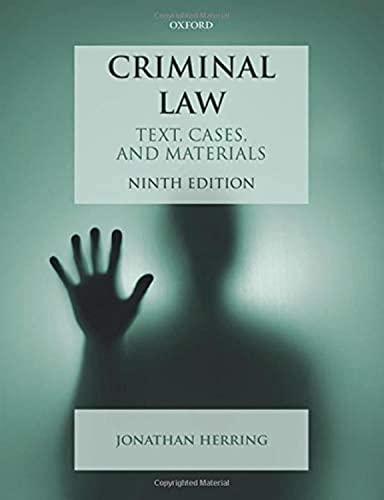Question
Part 1 Contract Law (a) Consider the following scenario. Matt owns a Chinese restaurant and discovers he has run out of rice. He goes to
Part 1 Contract Law (a) Consider the following scenario. Matt owns a Chinese restaurant and discovers he has run out of rice. He goes to the local supermarket. The following happens. 1. Matt takes ten bags of rice from the shelves and puts them in a shopping cart. 2. He goes to the till and puts the rice on the counter. 3. The cashier scans the bar codes and says: 'That will be 76, please.' 4. Matt hands over the money and puts the rice in a trolley. 5. The cashier hands Matt the receipt for his own records. Required: Explain for each step in the scenario what it represents in the formation and performance of a contract. (5 marks) (b) Temple plc sells goods with a warranty. If minor defects arose in all products sold, repair costs of 1 million would arise. If major defects arose in all products sold, repair costs of 5 million would arise. The experience of Temple plc experience is that: 30% of goods lead to claims for minor defects. 10% of goods lead to claims for major defects. 60% of the sold goods will have no defects. The financial manager of Temple plc has decided that a provision for this warranty should be recognised in its financial statements. Required: Calculate the amount of the provision. (2 marks) (c) In May 2023, legal action was instigated against Temple plc by an employee, who suffered multiple injuries as a result of an accident in Temple's Liverpool factory. The employee claimed that directors failed to provide adequate safety equipment. The company's legal advisers are of the view that a claim of up to 25,000 could be made against Temple plc, and they advise the directors that there is a 30% chance that the company will lose. Required: Explain the nature of the above item and how it should be recognised or disclosed by Temple plc in its financial statements for the year ended 31 December 2023. (3 marks) (Part 1: 10 marks) Question 4 B293 June 2024 TURN OVER 9 Part 2 Employment Law (a) Jack is an employee who is entitled to three months' notice. Consider what would happen in each of the following two situations. (i) The employer dismisses Jack on two months' notice and the employer gives no reason for the dismissal. (ii) The employer dismisses Jack without notice for stealing and disclosing confidential information to competitors. Required: State, for each scenario, whether Jack would have been wrongfully dismissed and give a reason why this is the case. (4 marks) (b) Explain what usually happens in case of a wrongful dismissal and state the usual remedy for an employee who has been wrongfully dismissed. (2 marks) (c) Jordan operates a business providing tax planning services in the accountancy sector. Frank has worked for Jordan for two years. Frank's contract is a 'zero-hours' contract and provides 'no guarantee of work'. In terms of his salary, Frank needs to submit a monthly timesheet and he is paid through the payroll system. Frank usually works from home and is allowed to work on other projects. Frank can even arrange for his work for Jordan to be done by someone else if he is too busy to do it personally. Required: Identify the most likely employment status of Frank, and provide reasons based on the above information, and using the three tests in B293, Unit 5, Session 2, Section 2.1.
Step by Step Solution
There are 3 Steps involved in it
Step: 1

Get Instant Access to Expert-Tailored Solutions
See step-by-step solutions with expert insights and AI powered tools for academic success
Step: 2

Step: 3

Ace Your Homework with AI
Get the answers you need in no time with our AI-driven, step-by-step assistance
Get Started


